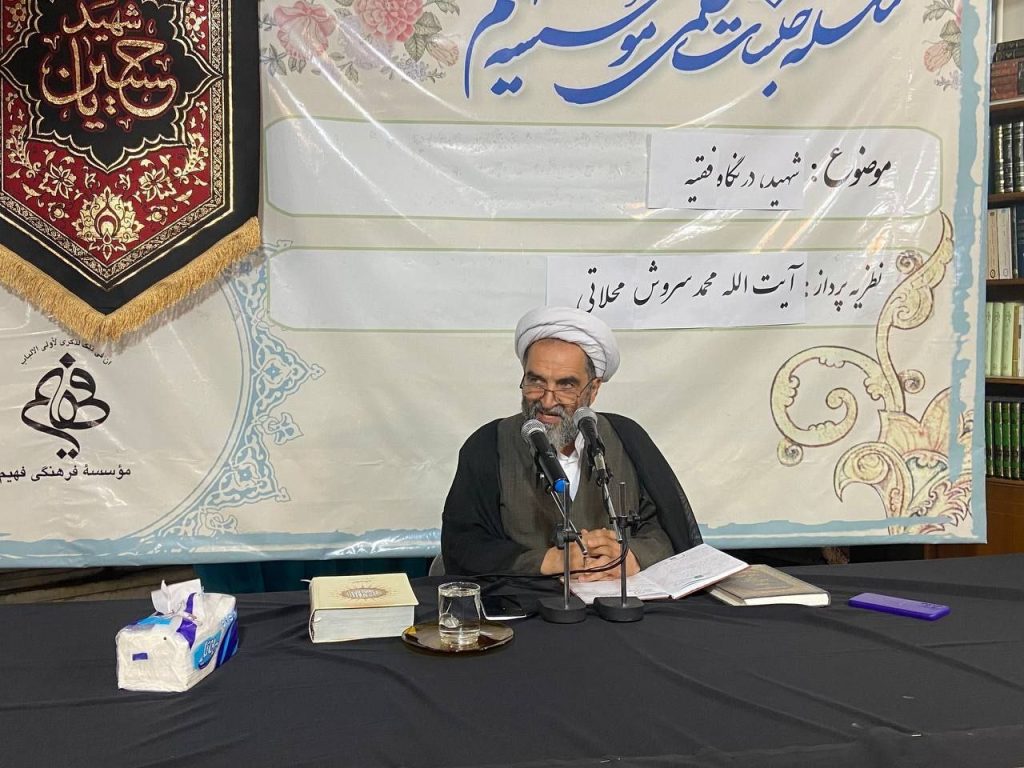
Title: The True Essence of Martyrdom: Ayatollah Saroukh Mahallati on the Virtues of Intention and Action
The Spiritual and Jurisprudential Dimensions of Martyrdom
In a profound discourse on the concept of martyrdom, Ayatollah Mohammad Saroukh Mahallati, a prominent scholar from the Qom Seminary, emphasized that true martyrdom requires both “husn-e fa’ali” (virtuous intention) and “husn-e fe’li” (virtuous action). Speaking at the Fahim Cultural Institute, he explained that merely being present on the battlefield does not qualify one as a martyr unless the intention behind the sacrifice is pure and aligned with divine purpose.
“If someone fights alongside the Prophet (peace be upon him) but seeks worldly gains or spoils of war, they are not truly a martyr,” Ayatollah Mahallati asserted. “The sincerity of one’s purpose is paramount.”
The Two Pillars of True Martyrdom
Ayatollah Mahallati outlined two essential criteria for martyrdom:
- Virtuous Intention (Husn-e Fa’ali) – The martyr must act solely for the sake of God, free from ulterior motives.
- Virtuous Action (Husn-e Fe’li) – The battlefield itself must be one of righteousness, where the struggle is in defense of truth and justice.
He clarified that even in the absence of an Imam or his appointed representative, defensive jihad remains legitimate. “One who is killed while defending against aggression towards Muslims is a martyr,” he affirmed.
The Legitimacy of Jihad and the Path of Martyrdom
Addressing the concept of “jihad-e haq” (righteous struggle), Ayatollah Mahallati referenced the views of Allamah Hilli, who maintained that martyrdom in the path of God is always commendable—whether victory is assured or not.
“Even if defeat is certain, Muslims are not obliged to accept a ceasefire,” he said. “Standing firm in the face of oppression, knowing death is inevitable, is a legitimate and sacred act—and those who fall in such a struggle are martyrs.”
Balancing Revolution and Wisdom
Ayatollah Mahallati cautioned against impulsive revolutionary fervor, urging a measured approach based on Islamic jurisprudence. He cited Quranic verses and historical precedents to emphasize that while martyrdom is noble, it must align with divine sanction and societal welfare.
“Some passionate youth may advocate relentless struggle without considering jurisprudential wisdom,” he noted. “But Islamic teachings guide us to assess conditions carefully—martyrdom must be both spiritually and legally valid.”
A Call for Informed Reflection
In closing, Ayatollah Mahallati encouraged deeper study of Islamic legal traditions before making definitive judgments on martyrdom and jihad. “We must derive rulings from established principles, not emotional impulses,” he stressed. “Those who seek to engage in this discourse should first understand its multifaceted dimensions.”
His remarks underscored the profound spiritual and jurisprudential considerations that define true martyrdom—a path of purity, purpose, and divine devotion.


